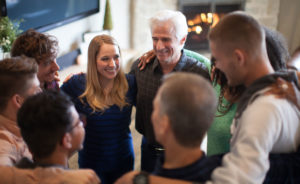MaryAnn Sibley: Church Volunteer Team Health and Volunteer Culture
This is a transcript from my conversation with MaryAnn Sibley about team structure, volunteer health, and church volunteer culture. MaryAnn founded MatterSpark to help ministry leaders build and lead healthy volunteer teams.
Watch the rest of this hour-long conversation on our YouTube channel.
First topic I want to talk about is, a couple of years ago when you and I met, one of the things that you kind of blew my mind with was… There are several things, and just about everything in here, you blew my mind with something. But one of the things you blew my mind with, was your team structure, which is not something that typically would blow somebody’s mind. But the reason you structure your team, the way you structure your teams, your volunteer teams, specifically. From a logistic’s perspective, but also a culture forming perspective. Your team structures are not, just because it’s an efficient way to schedule people and to make sure all your holes are filled.
Scott:
That’s, well, maybe a byproduct of the team structure, right? You get your… You cover your bases. It’s like, well, bare minimum. You’re going to cover your basis for roles, but there’s a team culture thing that really drives why you structure your teams the way you do. And I’m bearing the lead a little bit but I want to be clear that your team structure format is unique because it’s a culture for focus not because it’s an efficiency of ministry focus.
Maryann:
Right.
Scott:
In fact, I would even say that you are probably giving up a little bit of efficiency in the way you structure your teams and the way that you… Because one of the things you said you don’t use volunteer scheduling software, which I was like, what? How many people on your teams and you don’t use planning center or some other way of scheduling people? And sending out reminders. And which that’s, if there was one piece of software, pardon me, there is one. It’s a good thing you’re not like right in front of me because you would’ve just gotten [crosstalk 00:01:39]. If there is one piece of software that every volunteer team leader was like I can’t do that. This one piece I could get rid of everything else. But the one piece I can’t do without as a volunteer scheduling tool like planning center and you don’t even use it for your big old teams. So what’s going on? Why?
Maryann:
So this came from building, going from a volunteer team of when I was on staff of about 30 people and it grew to 200 and something needed to change. And through the two to 300 we kept tweaking it and it continues to, it grew to a volunteer base of over a thousand.
Scott:
Still no scheduling tool?
Maryann:
No. So, here are my three filters. So God is so good because initially it was about efficiency. Initially it was like this is crazy. Scheduling is the work of the enemy. I am convinced because every, which I talked to someone the other day and she was like, I am so frustrated and tired of thinking, who’s going to be here this weekend? Who’s going to be there? Where are they going to be there? I’m like, and there’s no margin for ministry. And so not only are you worn out from the scheduling, you’re just worn out. And bitter sometimes and angry.
Scott:
Yeah, it’s almost like you’re [crosstalk 00:02:59].
Maryann:
And so it’s like, and yet they have these tools. So it started from there. But God takes our offering and he goes with it. And what I learned from that is three things.
Scott:
If you’re only listening to this and you’re not watching the video, she did a mind blown expression when she said.
Maryann:
I do that a lot. You need major subtitles here? Here’s my three filters in working in building a team structure or anything. Number one, is it relational? Number two, is it sustainable? Number three, is it scalable? So someone would say, Oh, you did that with a thousand people. But when we would launch a campus and we would launch it with maybe 200 people and maybe 50 or 40 would volunteer. How do we take that? And it was scalable and everyone, and we didn’t have to reinvent the wheel.
Scott:
So when you say, so when most people say scalable, they think, how can I take what I’m doing at a small thing and make it bigger? What you’re talking about is we have this thousand person volunteer team, we need to scale it down without reinventing the wheel back down to 50 volunteers.
Maryann:
Yeah, I’m backwards on everything, Scott. I’m just a backwards girl.
Scott:
That’s really interesting though. I mean because I mean if you’re creating systems for a thousand people, you launch a campus or you create a new ministry or whatever, or you split off a team or a new department and you’ve got 50 people, a lot of those people are going to, a lot of leaders are going to think I’ve got to start fresh with a 50 person formatted system. And you’re saying, whatever we do at a thousand people needs to work at 50 people.
Maryann:
Yes. Yes. And I’m going to give a little shout out. There’s a, I think you’re familiar with these folks, the 95 Network.
Scott:
Sure. Yeah.
Maryann:
Because their whole thing is 95% of churches are 500 and less.
Scott:
Right.
Maryann:
In size. So I was working in a church that was over 10,000 in size.
Scott:
There’s an outlier.
Maryann:
Yeah, just a little bit. So I love that this thing that was created works for 95% of the churches that I talked to. And so it does work that way. And I think all I’m doing, oh my goodness. It seems simple, but this is where the coaching comes in because I think a lot of folks get stuck in the model of, it can’t be that simple. It can’t be that simple. They keep going back to what they used to know. Right. And so that’s the struggle to get them to kind of like stay in it, stay in the boat, stay in the boat. So we build teams first of all, and then we have to define what is a team. Because a lot of people I talked to were referred to them having a team, but they don’t have a team because they’re just pools the people.
Scott:
Yeah. You mean something other than… By team, you mean something other than a pool of people, I guess?
Maryann:
Yeah, there’s a big difference in my book. I [inaudible 00:05:56] like, Oh these five, six people. But they’re not a team. They don’t know one another. They don’t look across the thing and know what Joe’s doing and how Sally’s doing. And we’re not a team. We don’t understand her strength is over there. My strength is over here. You think of a sports team, everyone’s got their lane, everyone’s got their strengths, everybody knows. And we’re on the same team. So, that is a huge concept to work through first of all. What does a team look like at your church? But then every team needs a leader, a coach, someone’s got to lead that team. And so then the whole talk comes into building team leaders to lead those teams. And when we in our church staffs and church leaders can let go and let our volunteers and leaders actually do the things they’re called to do in the church, that’s when really big great things happen.
Maryann:
Because God’s now multiplied his efforts through 50 people versus one who was burnt out.
Scott:
Sure. Of course.
Maryann:
Right. So the team structure of saying, okay, this is going to be your team. I’m on this green greeter team and John is my leader and Sue’s my leader and this is who we are. When we show up, we know everyone on the team. We know when we’re, what time we’re coming in, we know, we know on the calendar that these are the six times we’re serving for the rest of the year. No one has to schedule me. No one has to… Now my leader will be checking up with me, but the staff person has picked the right leader. So I don’t need to micromanage my leaders either.
Scott:
Okay. So I’ll see if I can restate this in a way that it makes sure I understand it correctly. Is you have a department or you’re a ministry area, we’ll say instead of teams. So your ministry area would be, let’s say greeters because that’s primarily where you worked in, right? But this works, the same kind of thing works in children’s ministry and ushers or in worship or whatever. It’s a concept that is not just for first impressions, I imagine. I assume.
Maryann:
So, yeah, let’s clarify for me, my team of first impressions included from the parking lot, coffee, serving coffee. We served meals, we greeted, we guide, we had a welcome team, we did the ushering inside. So we were basically the people moving and getting them to the different places. Children’s ministry is a completely different area. I wasn’t over children’s ministry, but we were able to do some things like, well, we had service leaders and we had directors that were owning zones. And so they would come and say, wow, we’re able to take what you’re doing in pieces and apply it so we can kind of spread out the load in our area as well.
Scott:
Right, okay. Okay, so this Maryann’s team concept, trademark TM, is that that your ministry area of first impressions is not the team that’s your ministry area? Correct? When you say team, you don’t mean first impressions. When you say team, so also when you say team you don’t necessarily mean the coffee team or the usher team. When you say team, you mean everyone that is serving this Sunday is a team, is that correct?
Maryann:
Yep.
Scott:
Okay, so when you break it into red team, green team, blue team, yellow team. Your red team is serving altogether and within that red team. It’s all to get together on a Sunday morning. You have the coffee people, the usher people, the parking people, the door opener people.
Maryann:
Yep.
Scott:
Correct? What do you call those individual groups of people inside of your team?
Maryann:
So that would be the usher team. The greeter.
Scott:
Okay.
Maryann:
Parking. We called them roadies. Common grounds was coffee. Gathering place. Also, serve BHQ or volunteer central. We’ll talk about that a little bit more, but they also served our guests breakfast and such. And so I would have medical team. So we would have all those individual areas of posts per se, but what was really cool, here’s one of the things is we have got to crush church silos in ministry. First of all, not competing between churches, but even within the walls of our church on a Sunday. I hear too much of the us and them. Right. So the ushers, they do their thing, but they’re not part of us out here in the atrium. And I look at it from a standpoint of not only first time guests, but anyone coming church, we’re coming to church. So when I go to a hotel, we were actually in Disney World a couple of weeks ago and had been there I’ve never been there to stay that, but took my husband,
Scott:
We were just there this past weekend. Last weekend, first time in 25 years. Yeah.
Maryann:
We missed it. It was two weeks, ridden the rides together. But when I walked into the resort hotel, it wasn’t my job to go, are they going to take care of me or are they going to take care of me? Can I talk to that person or am I allowed to talk to this person? Or will they know? How hard is this going to be? So particularly churches, I mean we’re here. We’re glad you came. So I always go back to Isaiah where it talks about we take the mountains and he says, and we flattened them in the valleys we make high, we level. And the rough planes are made smooth and the big point of all at all, it’s so that they will see the Lord. So if there is a divot when you’re walking across the plane and you go for hole, man, that really hurts.
Maryann:
That’s not a great experience. So if I come in and it’s like crickets in the parking lot and I don’t even really notice it, but whatever. And then someone says hi to me. I’m like, okay, that’s what you do at church. They were kind of friendly. And then I go sit inside your worship center auditorium and nobody talks to me. Okay. It can be like, hi. I guess. I don’t believe Jesus died for. Okay. I guess. That’s just where I come from. I’m just like, it’s not that hard to smile and talk to someone. He died. We can just smile and talk to someone. I don’t think it’s on the same level. So when someone comes to church, even if they’ve been to church a long time and they’re able to go and then God does that supernatural thing where he’s using it and letting them know, see, I saw you.
Maryann:
See you’re seen. Oh, it’s a good thing you came today, you almost didn’t come today. Look at that. Isn’t this nice? Aren’t you comfortable? Now you can listen to this crazy message I prepared for you. And so I don’t think there should be an us and them if they, we should have it seamless where they come and they leave and they’re like, I don’t know what just happened at church today. But something happened. And so by bringing the people teams, not only for the individual areas that people serve, but if it was the red team and there was red greeters and red everything, then we all would get together in the morning and look around the entire room and go, it’s on us today. So we would have situations where we were low in the parking lot, ushers would go volunteer to go serve in the parking lot. We were there to help one another, right? We’re really brothers and sisters. This is what we’re here to make.
Train church volunteers and disciples online, easy.
Use our simple on-demand video training courses to equip volunteers, develop leaders, and teach disciples. Create your own training or use our video library. Our training automation platform makes it simple and fast to get your people ready for ministry.
Other Posts You May Like
All Growth Begins with Self-Awareness
My first year on the YouVersion Bible App team was exciting and challenging. I joined the team to help with partnerships and community-building. Like any new job, the first year came with a learning curve and the need to pick up new skills. I had never been part of a technology team before, so I…
Is Your Leadership Style Helping or Hurting You?
Your leadership style — how you make decisions, connect with and influence others, delegate, handle conflict, cast vision — is shaped by many factors. Your family history and work experience, along with your personality and internal wiring, impact how you think about and “do” leadership today. Leaders we have worked with, for better or worse,…
A Church Is Only As Healthy As Its Team
When you joined the team at your church, what kind of training did you get in the first weeks? Did you have an HR meeting to cover the health insurance and retirement accounts? Did you cover how to submit an expense report or reserve a room on the master calendar? How about how to handle…



